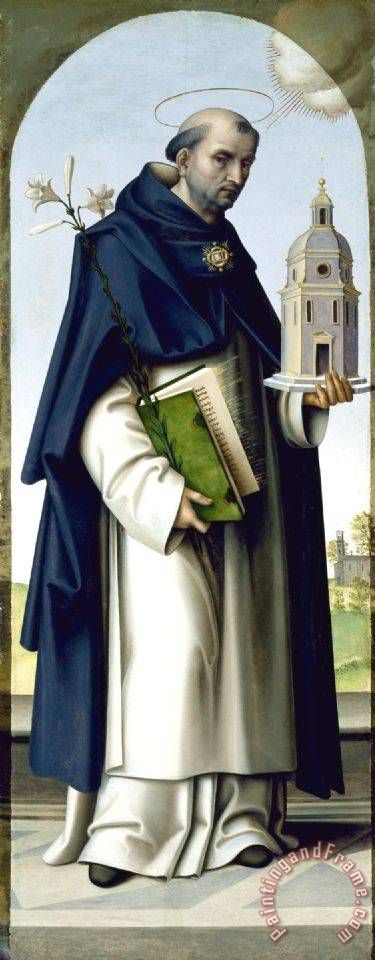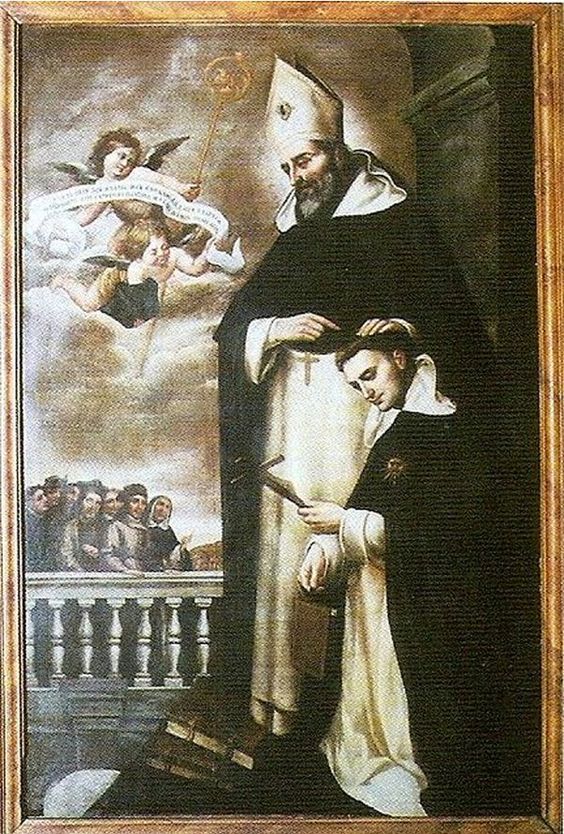dominican saints
St. Thomas aquinas, D. C.O.P.
Feast Day March 7th

Born: 1225 Roccasecca, Sicily
Died: March 7, 1274 in Fossanova, Papal States
Canonized: July 18, 1323 Pope John XXII
Patronage: Academics; against storms; against lightning; apologists; Aquino, Italy; Belcastro, Italy; book sellers; Catholic academies, schools, and universities; chastity, students
Saint Thomas Aquinas was born of noble parents about the year 1225, in the fortress of Rocca-Secca, in the south of Italy; and to the neighboring little town of Aquino he owed his surname of Aquinas. When he was quite a child, a terrific thunderstorm burst over the castle, and his nurse and little sister were struck dead in the very chamber in which Thomas slept on unharmed. This circumstance accounts for the great fear of thunder and lightning which the Saint is said to have had through his life, which caused him often to take refuge in the church during a thunderstorm, even leaning his head against the tabernacle, so as to place himself as closely as possible under the protection of our Lord; hence the popular devotion to him as patron against thunderstorms and sudden death. The words Ave Maria were the first which his baby lips were heard to utter; and long before he could read, to place a book in his hands was discovered to be an unfailing means of drying his tears in all his childish troubles.
When only five years old, his education was begun by the monks of the celebrated Benedictine Abbey of Monte Cassino and by the time he had reached his eleventh year he had made such progress that his parents sent him under the care of a tutor to the newly founded University of Naples. The Dominican Church in that city became one of his favorite resorts, and, whilst still quite a boy, he asked and obtained the habit of the Order. As the Saint and his religious Brethren believed his family to be extremely averse to the step he had taken, he was hurried off to Rome,
whence it was intended to remove him to Paris. But, on the way thither he was waylaid by his brothers, two young officers in the service of the Emperor, and sent back to his angry parents at Rocca-Secca. Here he was imprisoned in one of the towers of the castle, where he had to suffer cold, hunger, and every sort of privation. Worse than this, his brothers even went so far as to introduce a woman of evil life into his chamber; but with a flaming brand snatched from the hearth the Saint drove the miserable creature from his presence. With the same brand he then traced a cross upon the wall; and, casting himself upon his knees before it, besought of God to grant him the gift of perpetual chastity. As he prayed, he fell into an ecstasy, during which two angels appeared and girded him with a miraculous cord, at the same time assuring him that his petition had been granted. In memory of this event a Confraternity was established in the sixteenth century, called the “Angelic Warfare,” to obtain through the intercession of Saint Thomas the virtue of chastity. This Confraternity still flourishes.
Discovering that his constancy was not to be overcome by persecution, his disappointed relatives at length connived at his escape, and he was let down from the tower in a basket by the Friars who by appointment were waiting below. They carried off their rescued treasure to Naples, where he was immediately admitted to profession. Thence he was sent to Cologne, where he became the disciple of Blessed Albert the Great, the renowned Dominican professor of the day. The humble Saint at first succeeded in concealing his extraordinary talents from the knowledge of his brethren, but when at length they were accidentally discovered, his delighted Master exclaimed, “We call Brother Thomas ‘the dumb ox’; but I tell you he will one day make his bellowing heard to the uttermost parts of the earth.” Blessed Albert and his saintly pupil afterwards taught together, with immense applause, first at Paris and subsequently at Cologne. It was in the University of the former city that Saint Thomas took his degrees, first as Bachelor and afterwards as Doctor in Theology. On both these occasions he had as his companion his beloved friend, the great Franciscan theologian, Saint Bonaventure.
Saint Thomas commented on the works of Aristotle, and, having purged the text of the pagan philosopher from everything that was opposed to the truths of faith, established a complete system of Christian philosophy. Amongst his many works we may mention his “Summa against the Gentiles,” his treatises on the Our Father, the Hail Mary, and the Creed, and, most important of all, his “Summa of Theology,” which, however, he did not live to complete. It was at his earnest entreaty that Pope Urban IV. extended the celebration of the Festival of Corpus Christi, already kept in Germany and the Low Countries, to the Universal Church. The Saint wrote the Office for the feast and was the author of those hymns to the Blessed Sacrament with which we are all familiar from their use in processions and at Benediction. He also composed the Adoro Te and the Anima Christi (Soul of Christ, sanctify me) which was a favorite prayer with Saint Ignatius. On one occasion our Lord spoke to him from a crucifix, saying, “Thou hast written well of me, Thomas, what reward wilt thou have?” To which the Saint replied, “No other than Thyself, O Lord.”
Saint Thomas had not yet completed his fiftieth year, when, worn out by his labors in preaching and teaching, he breathed his last at the Benedictine Abbey of Fossa Nuova, on his way to attend the General Council of Lyons. His death took place on the 7th of March, A.D. 1274. He was canonized A.D. 1323 by John XXII.; A.D. 1567, Saint Pius V. conferred on him the title of Doctor of the Church; and A.D. 1880, Leo XIII. declared him patron of all Catholic universities, academies, colleges, and schools.
Humility was ever the characteristic virtue of this great servant of God and from his humility sprang his extreme modesty in the expression of his opinion. Though raised so high above others by his gigantic intellectual powers, Saint Thomas was the sweetest and most charitable of masters and of fathers, always ready to stoop to the capacity of the youngest and dullest of his scholars. No matter how important the affair might be in which he was engaged, his cell was always open to his Brethren whenever they wished to speak to him, and he would cheerfully turn from the most absorbing occupation to give them his undivided attention. Most touching and beautiful is the account left us of his manner of spending his time and of the means he adopted for sanctifying the ordinary actions of the day by devotional practices. But the limited space at our disposal in this short biography compels us to conclude. We can but mention one out of many of his remarkable sayings, viz., the answer given by him to his sister when she asked him what she must do to become a Saint. “Velle” he replied, i.e. “Will it.”

Prayers/Commemorations
VESPERS
Ant. The Doctor, citizen of heaven, ornament of the world, guide and light of the faithful, rule, path, law of all morals, vessel of virtues, has climbed the summit of life.
V. Pray for us, St. Thomas.
R. That we may be made worthy of the promises of Christ.
AT LAUDS
Ant. The freshness of the flesh through the flower of purity; vigor of life through the fruit of justice; splendor of the word through the gift of knowledge, decorating thee then in the combat, crowning thee now in glory.
V. The just shall flourish like the lily.
R. And shall prosper for ever before the Lord.
SECOND VESPERS
Ant. O Saint Thomas, Doctor of the Church Militant, flourishing by virginal purity, obtain for us the desired joys of the Church Triumphant.
V. Pray for us, St. Thomas.
R. That we may be made worthy of the promises of Christ.
Let us pray
O God, who didst make Thy Church glorious by the marvelous learning of Blessed Thomas, Thy Confessor and Doctor, and renderest it fruitful by his holy actions: grant us, we beseech Thee, clearly to understand the things which he taught, and faithfully to imitate what he performed. Through Christ our Lord.
R. Amen.
